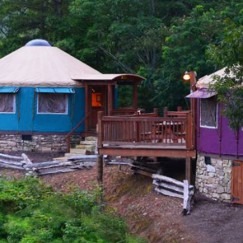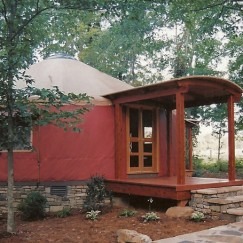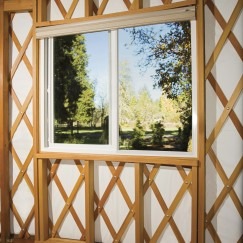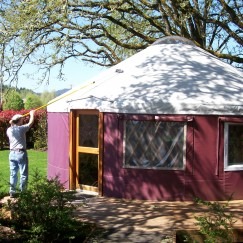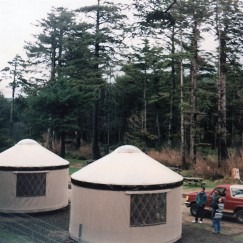Solar Power for Yurts: Benefits and Considerations
 Although many of our customers use traditional utilities and power, more and more families, both in the US and around the world, are choosing to live off-the-grid. That is, they are choosing to live where they are not connected to traditional energy sources.
Although many of our customers use traditional utilities and power, more and more families, both in the US and around the world, are choosing to live off-the-grid. That is, they are choosing to live where they are not connected to traditional energy sources.
Many families do this because they want to leave a smaller environmental footprint. Others prefer it because it allows them to live independently and be self-reliant.
Owners of energy-efficient yurts have long been among the off-the-grid community. It is easy to see why. Yurts are often set in areas far from traditional power sources, since yurt lovers tend to be nature lovers as well. They are wonderful structures for those looking to escape the cost of traditional power sources.
Solar Power Options
 Solar power has become very popular with yurt owners. It is not location-specific in the same way that wind- and water-powered energy sources are, and it’s also the most economical alternative to traditional energy options.
Solar power has become very popular with yurt owners. It is not location-specific in the same way that wind- and water-powered energy sources are, and it’s also the most economical alternative to traditional energy options.
Solar power offers different options, some of which are either fixed or portable. Fixed systems are generally more powerful, but they tend to cost more. Traditional homeowners of larger homes will often choose panels because they have the space for them. Owners of smaller homes will often fittingly choose smaller portable units. Many companies have wonderful solar kits, some of which are portable. The smaller ones can be purchased for around $300-$600.
It’s important to remember that solar powered energy is only as abundant as the sunlight is. Solar energy decreases on days when sunlight is less abundant and does not accumulate at all through the night. To have solar power you must have direct sunlight with no shadows. You can have partial power on overcast days, but shadows falling directly on a panel will reduce power significantly. The amount of power a panel or a kit produces depends on the number of modules and the number of daily hours of sunshine.
Solar panel modules work by charging batteries, so instead of plugging something into the wall, you are plugging into a battery that is pulling from the sun. It also involves a charge controller, batteries, a power inverter, and possibly a standby inverter. An engine generator is also usually part of the system as a backup. There are a handful of fuses and or circuit breakers, in addition to meters and a power center.
 In terms of wiring, lighting, and outlets, yurt owners using solar powered sources have the same options as any other homeowner. Wiring can be brought up through the platform of the yurt, or it can be installed in any interior dividing walls within the yurt. As far as lighting goes, low voltage is always the best idea. And while yurt owners do have the option of almost any kind of lighting that would be used in a regular home, it is always best to check to make sure that the lighting is compatible with a power inverter.
In terms of wiring, lighting, and outlets, yurt owners using solar powered sources have the same options as any other homeowner. Wiring can be brought up through the platform of the yurt, or it can be installed in any interior dividing walls within the yurt. As far as lighting goes, low voltage is always the best idea. And while yurt owners do have the option of almost any kind of lighting that would be used in a regular home, it is always best to check to make sure that the lighting is compatible with a power inverter.
Calculating Your Energy Needs
 Before purchasing any solar equipment, you will need to calculate how much power you actually need. You can find online energy calculators that will help you figure out how much power your lights, appliances, and technology might require. It all depends on what you have and what your family’s needs are.
Before purchasing any solar equipment, you will need to calculate how much power you actually need. You can find online energy calculators that will help you figure out how much power your lights, appliances, and technology might require. It all depends on what you have and what your family’s needs are.
Running large appliances, for example, can be extremely costly using solar energy, so it’s important to take a close look at it. The experts always recommend that you minimize your system.
The cost of setting up the system will depend on what energy numbers in watts are needed. Most solar companies provide a calculator to figure out how many kilowatt hours you need to produce in order to have adequate power in your yurt home.
Learning About Solar Power
 One of the best ways to explore solar power options is to contact one of the many companies who sell the panels or generators. Many companies even offer tiny house or yurt packages that make the purchasing process easy for new owners of energy-efficient yurts.
One of the best ways to explore solar power options is to contact one of the many companies who sell the panels or generators. Many companies even offer tiny house or yurt packages that make the purchasing process easy for new owners of energy-efficient yurts.
There are some very useful questions to ask when speaking with solar companies. For example, ask about the options of where to mount the solar panels or store the generators. You might also want to ask if they will provide a wiring diagram for your electrician. And, of course, you will want to ask if they offer technical support or assistance with installation or repairs.
